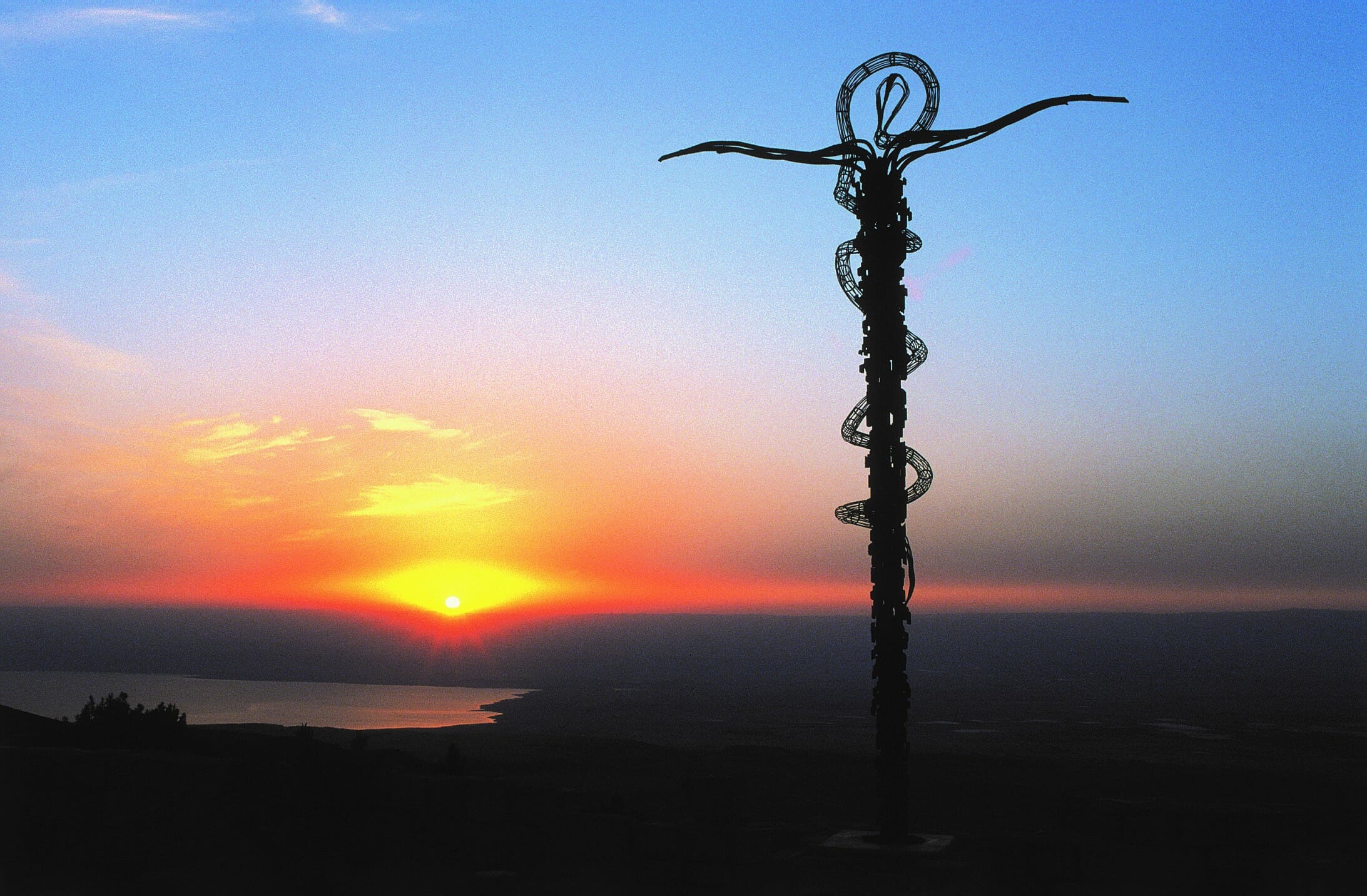
Mount Nebo staff at sunset
Photograph credit: Zina Ammari
Moses, Mount Nebo and MLK: Looking into the Promised Land
Curtis Ramsey-Lucas
April 5, 2019
The sun sets over a busload of Chinese tourists. An Arab businessman in traditional white tunic and keffiyeh stands beside his black-suited bodyguard, looking west toward Jericho. European and American pilgrims worship together, while others view sixth-century mosaics in the church at the summit of Mount Nebo.
What would Moses think of this scene? How must he have felt looking out over the Dead Sea at the broad expanse beyond? Was Moses fulfilled, having led his people this far? Was he satisfied knowing they would reach their destination, although he knew he would not? Was that enough for Moses? Or did he hope for more?
Because Moses broke faith with God at the waters of Meribah-kadesh in the wilderness of Zin and did not treat God as holy in the midst of the people of Israel, God allowed Moses to see — but not enter — the Promised Land (Deuteronomy 32:51–52). I have long questioned the justice of this punishment. Moses was faithful. He was obedient. Initially reluctant to go to Pharaoh, he went. Having led the people of Israel out of slavery in Egypt, through the wilderness, to the border of Canaan, it seemed only fitting he should enter the Promised Land with them.
Moses was 120 years old when died, although his sight was not diminished and “his vigor unabated.” With or without entering the Promised Land, he had lived a long and consequential life.
On the eve of his assassination, Martin Luther King Jr., shared his mountaintop experience. Speaking at Mason Temple in Memphis, Tenn., King said that, like anyone else, he hoped to live a long life — that longevity has its place. Still, he intimated that a different fate awaited him. Because he had survived a stabbing during a book signing in New York City in 1958, and faced death threats and heightened security measures for years, it is understandable how fatalism and the sense his death would come sooner, rather than later, had taken up residence in King’s mind.
Even so, on April 3, 1968, King told his audience he was unconcerned with it. He simply wanted to do God’s will. God, he said, had allowed him to go up to the mountain, and, like Moses, he had looked into the Promised Land.
“I may not get there with you,” King said. “But I want you to know tonight that we, as a people, will get to the Promised Land.”
Like Moses, King was able to see the fulfillment of a promise, even if he doubted he would live to experience it himself. Like Moses, King lived a consequential, if not a long, life.
Like Moses, King was able to see the fulfillment of a promise, even if he doubted he would live to experience it himself. Like Moses, King lived a consequential, if not a long, life.
Despite progress, 51 years after King’s death in Memphis, it is an open question whether we, who are alive today, will enter the Promised Land of which King spoke. Will we live to see a land in which racial and economic justice are a reality, rather than a dream? Will we know a world in which nations are able to set aside disputes and settle differences peacefully?
King’s vision of the Promised Land was a social and political vision of a transformed America as well as an eschatological vision of the coming of God’s kingdom. His faith in the ultimate triumph of God’s kingdom surely tempered his doubts about the present or near-term prospects for racial and economic justice in the United States — the difficult days ahead of which King also spoke in Memphis.
King’s vision of the Promised Land was a social and political vision of a transformed America as well as an eschatological vision of the coming of God’s kingdom.
As with nations, so with individuals. No matter the length of our lives, we do not fully live into the promises of God in our lifetimes. As a pastor, you cannot know with certainty the impact you have had on the congregations and communities you have served. As a parent, you cannot know the outcome and impact you have had on your children and grandchildren’s lives.
We live in the tension between now and not yet. We see but do not enter a future we help shape by how we live today.
Absent the leadership of King, our nation has not come as far as it might have toward the fulfillment of racial and economic justice. Absent his ongoing witness to the power of nonviolent coexistence, our world is not as peaceful as it might be. The responsibility falls to us to take up the mantle of economic and racial justice, to work for a better future for our children and grandchildren. It is on us to do our part to work toward the day when our nation and all people’s will settle disputes and differences peacefully.
Curtis Ramsey-Lucas is editor of The Christian Citizen, a publication of American Baptist Home Mission Societies. First published in The Christian Citizen April 3, 2018.
The views expressed are those of the author and not necessarily those of American Baptist Home Mission Societies.
Want the latest from The Christian Citizen?
Subscribe to Christian Citizen Weekly

